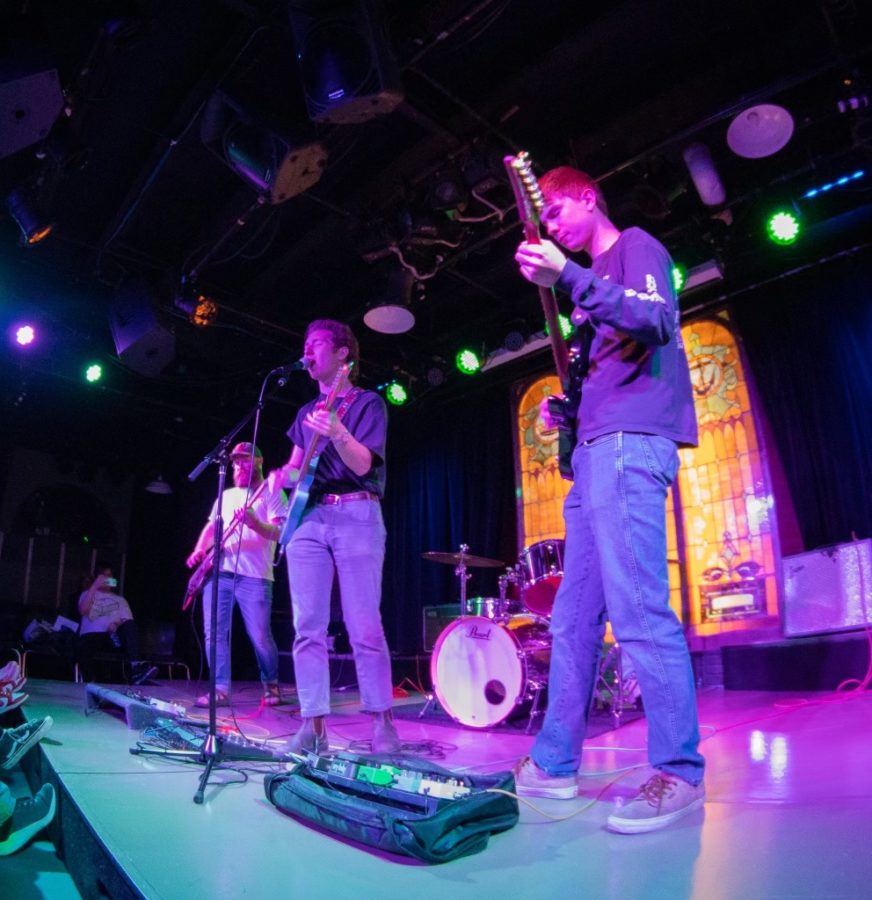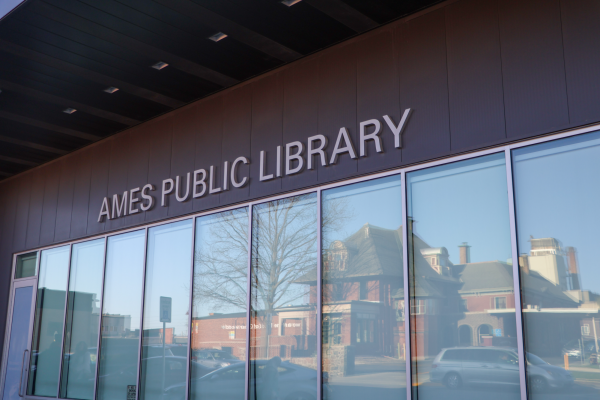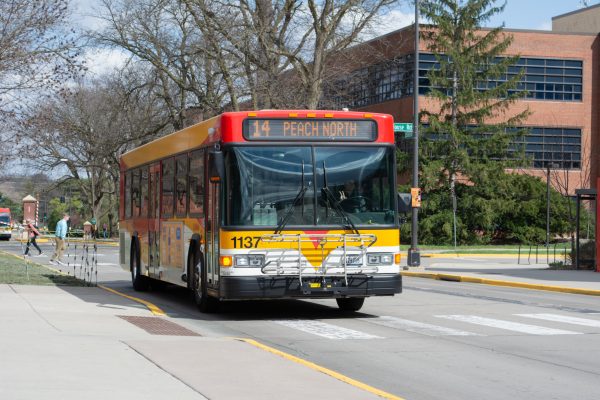Live at the Maintenance Shop: Behind the venue’s history
Vehicle Dynamics performs at an M-Shop open mic night on April 25, 2023.
It’s a Friday evening in 1984, and the crowd at the Memorial Union’s upper terrace is tightly packed to watch the next band perform. Students gather around the stage, holding plastic cups full of Miller High Life. Some clutch crumpled dollar bills in anticipation of kegs; others enjoy the excitement brought by the F.A.C. – Friday Afternoon Club – pack.
Beer or not, all are there for a reason: to be a part of the Maintenance Shop’s latest terrace party and to see the blues band that just rolled in from Chicago.
Backed by an extensive history, the Maintenance Shop has been broadcasted internationally over public television, hosted hundreds of performers and housed thousands of patrons. It continues to be Ames’ only full-time, live entertainment facility open to ISU students and community members of all ages.
A General Overview
F Michael Miller began his time at the M-Shop in 1983 as the sound man, becoming the bar manager and technical director the following year. In total, Miller worked with the M-Shop for six years.
According to Miller, the M-Shop would host shows every weekend when classes were in session and often during the week as well.
“[With] the way the Maintenance Shop was set up, I ran the bar, I hired all the staff and I just happened to be the tech director because I used to be a professional roadie, professional sound man,” Miller said.
As technical director, Miller worked alongside the M-Shop directors, who booked and decided on acts.
According to Miller, unless you were really plugged into the music scene, acts at the M-Shop were not always well-known, which is often still the case. However, the venue was known to host up-and-coming artists.
“We had the chance to get ‘Weird Al’ Yankovic, for, oh man, $2,400, and I begged them. I said ‘You’ve got to get him,’” Miller said. “They didn’t, and right as I was trying to lobby for us to get him, ‘Eat It’ came out, and all of a sudden he cost 10 times more.”
The M-Shop also held parties on the Memorial Union terrace Fridays before home football games from 1982 to 1988.
“We’d block off the terraces to the Union; we’d bring in either a local band, maybe a blues band from Chicago and 75 to 100 kegs of beer, and thousands of students would show up,” Miller said. “I can’t believe the Union let us get away with that, which is probably why they don’t now.”
Past efforts were made by Student Union Board (SUB) members to revamp the terrace parties in 2003, but the tradition, which thrived when the legal drinking age was 18, was ultimately halted.
During Miller’s time, the venue also hosted the Blues Series, which put on shows featuring four different blues bands. According to Miller, Blues Series shows consistently sold out.
“Back in the 80s, blues was really big. Blues fans loved to play the M-Shop because they knew they were pretty much guaranteed a good crowd,” Miller said. “It’s a small room, we treated them well [and] the green room was always clean, and that’s not necessarily the case in other clubs across the country.”
The Blues Series was part of a three-piece Public Broadcasting Service (PBS) program, including Jazz at the Shop and At the Maintenance Shop, which featured artists of a variety of genres.
Dan Rice, manager of the M-Shop from 1980 to 1984 and a co-producer of the PBS Blues Series, said the M-Shop’s reputation for hosting blues and jazz artists was already set in stone when he arrived.
“We never really had to go after bands; they all wanted to come play the [Maintenance] Shop because they knew about it,” Rice said.
According to Rice, Ames’ central location from major Midwestern cities was crucial in finding artists to play the venue.
“A lot of the time, the jazz and blues artists would have a layover in Ames to do a show when we would do shows every night of the week; it wasn’t just weekends,” Rice said. “So, when they were traveling from one place to the other, they’d do the Maintenance Shop.”
When Rice began working at the M-Shop, it was completely student-run. According to Rice, the M-Shop was the place to be for students in the early 80s, with shows and events happening weekly.
“My last year there in ‘83-’84, my goal was to never have something not going on in the [Maintenance] Shop,” Rice said. “We’d do noontime presentations with movies; we’d do lectures. We’d do all sorts of things.”
The Venue’s Beginning
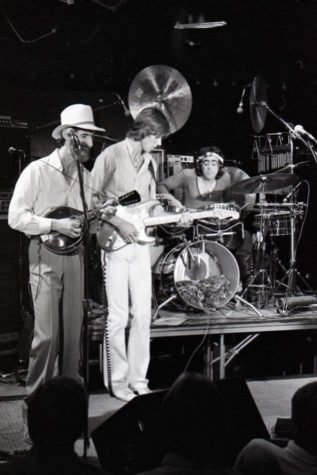
Larry Grant, a member of the Memorial Union Board from 1971 to 1974, was around for the M-Shop’s official opening in 1974.
The acquisition of the M-Shop’s iconic stained glass was a product of efforts by Grant, former SUB President Steve Jensen and other student board members who won a bid for the window at a local church auction.
Grant said during his time with the SUB, there was a convergence of three things that led to changes in how both the Memorial Union and M-Shop operated.
In 1986, the legal drinking age changed from 18 to 21, which forced universities to change policies around serving alcohol on campus.
Additionally, the Memorial Union needed to physically expand to build the bookstore addition.
“The third thing was that the Alumni Association was very interested in having alcohol served in the Union, so those were sort of the three things that came together to propel alcohol in the Union,” Grant said.
Contention over whether or not to serve alcohol was further complicated by the fact that the Union was its own corporation, operating independently as a non-profit since its opening in 1928.
The M-Shop in the ‘90s
Rusty Tedrow began working as the M-Shop’s program coordinator in 1991, with a background in managing and promoting comedians and bands as well performing in the San Francisco Bay Area.
Tedrow said she knew what it was like to be an artist coming into a venue and what to expect. She spent nearly a decade at the M-Shop and left the position with a legacy that lasted even longer.
Those who have entered the M-Shop’s sound booth may have seen the words ‘Rusty was here for a long, long time’ scrawled on its wall. Tedrow built the stage the venue currently uses and was instrumental in helping the M-Shop win the W.C. Handy Award for Best Blues Club in America in 1994.
“My skills in the music industry gave my all-student, mostly volunteer staff–the techies were paid–a sort of apprenticeship, and many of them went on to careers in the industry based on their experience there,” Tedrow said.
Tedrow led a crew of student employees and volunteers, often working multiple late nights a week booking shows and setting up the space.
In her role as program coordinator, Tedrow said she actively tried to educate SUB members and introduce new acts.
“We didn’t know everything that was cool, and that was the point,” Tedrow said. “I was in my 40s working with a student director who was in school and was much more hip than me, so we’d worked together. I taught them music history, and they taught me what was coming up, and we’d agree on what sucked.”
Tedrow said in the 90s, the M-Shop had a higher focus on being a regional and national music venue, with more than 50 shows per semester and three public TV music series under its belt.
“It was a hallmark of the M-Shop that some of the most stupendous shows that ever happened in there were the late shows that only had like 40 people,” Tedrow said. “We’d turn the house and do two shows a night so that we could make enough money to bring the artists in.”
Tedrow said the M-Shop’s niche, known nationwide, was for up-and-coming bands. The venue also hosted legacy performers, with bigger names like Arlo Guthrie and Lonnie Brooks who returned yearly as well as smaller local and regional bands.
“The Smashing Pumpkins played a gig with a $3 ticket up the [Memorial Union] terrace; Toad the Wet Sprocket was hitting the charts as they played the [Maintenance] Shop,” Tedrow said. “Our marketing plea involved a lot of ‘Trust us, you’ll be able to say you saw them way back when.’”
Tedrow and SUB workers also implemented intensive crowd control methods during her time at the M-Shop to preserve the venue’s friendly reputation.
“We had the mosh pits really well controlled,” Tedrow said. “We had no watersports, no diving, no surfing; that was for the heavy-duty ones where the place was absolutely packed. We’d have a row of [volunteers] across the front of the stage bent over literally being bumpers.”
University takes ownership
In 2002, the Board of Regents adopted a resolution to transfer the Memorial Union to the university in an agreement between itself, the ISU Memorial Union Corporation and Student Government. With this, the university assumed approximately $4.7 million in debt, previously incurred by the Union.
According to Grant, the Union was governed under a 30-person board of directors, which included 12 student members.
“Even though the Memorial Union was technically separate, its purpose was part and parcel of the Iowa State mission, so there [were] lots of compromises and things always worked out so that everybody could get along,” Grant said. “The idea of alcohol in the Union was a conflict because the long-term management of the Union didn’t want it, and the alumni wanted the students to have it because we were the point of the spear.”
While laws and regulations have since changed, the M-Shop’s bar is still open to of-age patrons during ticketed concerts and a variety of other events.
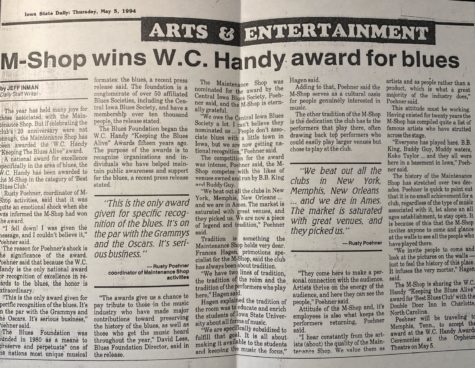
Grant said once the bookstore addition was added, the plan was for the maintenance workers to take the lowest level of that addition, which opened the space the M-Shop currently occupies.
“In some way, there was a parallel effort where the students via the Student Union Board were granted that space for a student lounge or a study hall or a library,” Grant said.
According to Grant, SUB members Greg Gantner, John Lee and Susan Lee pushed for the student space to be used for theater and musical performances – thus beginning the M-Shop as it is known today.
In its early years, the M-Shop held a dual role of both a theater and music venue.
The first event held in the M-Shop was a theater production of “Man of La Mancha,” which was held before the M-Shop officially opened.
“‘Man of La Mancha’ was put on in December of ’73, and while it was a play for people to come and see, it was also sort of our test of a facility,” Grant said.
The M-Shop began hosting bands shortly after as well as summer theater productions held by members of the Memorial Union Resident Summer Theatre (MURST).
The M-Shop Today
While MURST’s summer productions no longer occur, the M-Shop continues to hold open mic nights, touring comedy acts and Grandma Mojo’s comedy improv performances.
Jim Brockpahler, the current entertainment programs coordinator for the M-Shop, has been working with SUB since 2011.
Brockpahler advises SUB’s programming team, which includes the student M-Shop directors, who coordinate all M-Shop performances and events. He also manages a student bar team that handles food and beverage sales during events, a student box office team that staffs the space and sells tickets during open lounge hours and events and the M-Shop tech team, who work audio and visuals.
According to Brockpahler, the M-Shop has remained steady throughout the venue’s history, aside from the university-wide shutdown during the pandemic. By spring 2022, the M-Shop slowly started to move back toward a regular booking of shows and better attendance.
“Concert and other event attendance has basically been pretty solid and steady on average across the board throughout my time here, as I’d guess it has been throughout the M-Shop history,” Brockpahler said.
Brockpahler said attendance is also largely dependent on what and how many shows are booked, how they’ve been marketed and a variety of other factors.
“There have been numerous changes, both big and small, over the years, but throughout it has been an ISU student-run and -booked club venue that continues the success and entertainment-enjoyment that began back in 1973,” Brockpahler said.
Your donation will support the student journalists of the Iowa State Daily. Your contribution will allow us to purchase equipment, send our student journalists to conferences and off-set their cost of living so they can continue to do best-in-the-nation work at the Iowa State Daily.


